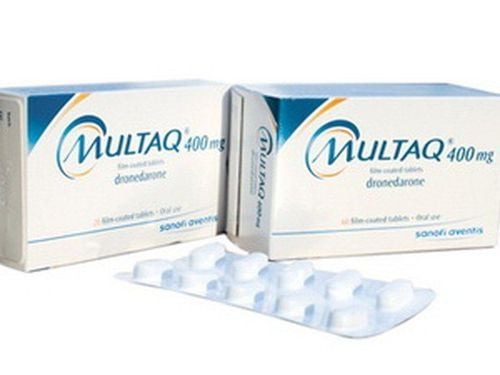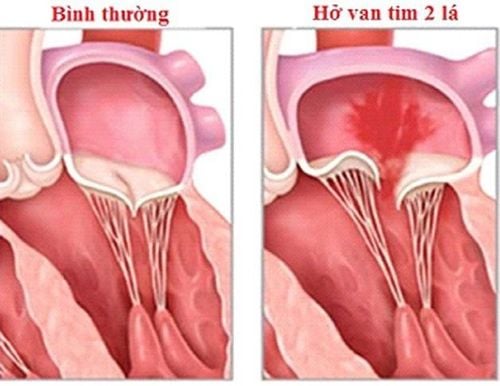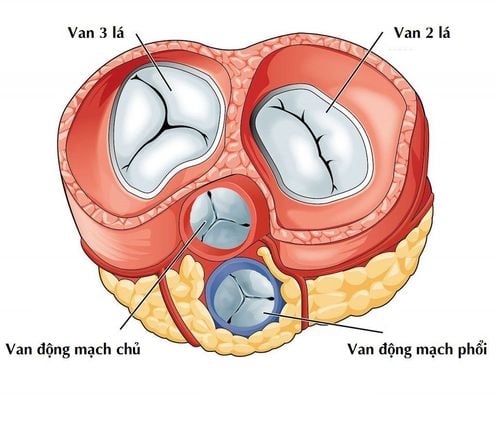This is an automatically translated article.
The article was professionally consulted by a doctor at Cardiology Center - Vinmec Central Park International General Hospital.Treatment of mitral regurgitation depends on the severity of progression or until the patient has symptoms. For mild mitral regurgitation, no treatment is usually needed. Open surgery, valve repair or valve replacement for very severe mitral regurgitation; If not treated promptly, it can cause heart failure or arrhythmia.
1. Symptoms of mitral regurgitation
Mitral regurgitation progresses for many years without any symptoms. Signs and symptoms:Depending on the degree of regurgitation and disease progression, the following symptoms may occur:
Unusual murmur on auscultation of the heart Shortness of breath during physical activity or lying down Fatigue Palpitations Tachycardia, palpitations Ankle or leg edema Mitral regurgitation is usually mild and progresses so slowly that the patient is almost unnoticed. Often patients will be discovered incidentally during physical examination or sometimes suddenly have severe symptoms.

Khó thở khi hoạt động thể lực hoặc khi nằm là một trong những triệu chứng của hở van 2 lá
2. When to see a doctor?
When the doctor listening to the heart with a stethoscope detects an abnormal murmur, the patient will be advised to see a cardiologist to perform an echocardiogram. If symptoms are caused by a leaky heart valve or another heart problem, see your doctor right away.3. Causes of mitral regurgitation
Mitral valve prolapse Injury to the lower posterior muscle column Infective endocarditis Myocardial infarction Dilated cardiomyopathy Trauma Congenital valve regurgitation Drugs: Ergotamine-containing drugs used to treat migraine headaches,... After Radiation therapy Atrial fibrillation Age factor is one of the risk factors for degenerative mitral regurgitation.4. Complications
Heart failure: When the heart does not pump enough blood when the body needs it, the blood flows back because the valve is not closed properly, the left heart chamber is enlarged and if not treated in time, it will become gradually weakened, pulmonary hypertension, stagnant fluid. , affecting the right heart.Atrial fibrillation: Large left atrium to a certain extent will produce arrhythmia, irregular. Atrial fibrillation is easy to form blood clots in the heart chambers and if the blood clots travel to other parts of the heart, it will cause serious problems such as stroke,...
Pulmonary hypertension: No treatment for mitral regurgitation or treatment Improper can affect pulmonary blood vessels, increase left atrial pressure, gradually increase pulmonary pressure, cause right heart failure.
5. Diagnosis
In addition to taking the medical and family history, the doctor will listen to the heart with a stethoscope and order the following tests:Echocardiogram Electrocardiogram Straight chest X-ray Heart MRI: This test is valuable for evaluation. CT left ventricular flow, size, and function: In developed countries, robotic mitral valve repair has been deployed before patients undergo CT scans of the chest, abdomen, and pelvis to see if they are suitable for surgery. . Stress test: Measures your stress level and your heart's response to physical activity. If the patient is unable to exert himself, treat with medication to minimize the effect of exercise on the heart. Cardiac catheterization: Not commonly used to diagnose mitral regurgitation. Used to measure pressure in the chambers of the heart.

Siêu âm tim là một trong nhiều phương pháp chẩn đoán hở van tim
6. Treatment of mitral regurgitation
Medical Diuretics: Reduce fluid retention in the lungs, in the legs, corresponding to valve regurgitation. If you have atrial fibrillation and you need medication to prevent blood clots Antihypertensives: High blood pressure makes mitral regurgitation worse, your doctor will prescribe medication. Intervention/surgery The problem of valve repair or replacement, even if the patient is asymptomatic, is essential if complications are prevented and prognosis is improved. If the patient needs surgery for another heart condition, the doctor will repair or replace the mitral valve if there is severe mitral regurgitation.Mitral valve surgery only requires 1 incision in the chest, non-invasive open heart surgery.
Some centers will perform heart surgery by robot, the surgeon will see the heart in 3D, clear images and use the robot arm to perform complex movements in open heart surgery.
The doctor will discuss with the patient whether the valve should be repaired or replaced depending on each person's situation; At the same time, doctor six also evaluated the patient whether to have minimally invasive surgery or need open heart surgery.
If the patient's heart valve can be preserved and the heart function is still good, the doctor will recommend valve repair, however, if the valve cannot be repaired, the problem of valve replacement should be raised.
Mitral valve repair Techniques to repair the leaflets, replace ligaments, or remove excess valve tissue to close the valve leaflet.
In addition, interventional cardiologists can use a system of wires going from the inguinal artery with a "clip" to reconstruct the mitral valve with severe regurgitation.
Replacing the mitral valve If the valve cannot be repaired, the problem of valve replacement is raised. The surgeon will remove the diseased valve and replace it with a mechanical valve or a biological valve. Biological valves will degrade over time and need to be replaced. Mechanical valves require lifelong anticoagulation to prevent valve blockage.
Cardiovascular Center is one of the leading centers of Vinmec Central Park International General Hospital. The expert team of the cardiovascular center includes experienced professors, doctors, specialists, and masters who are famous in the field of medical and surgical treatment, interventional cardiac catheterization and the application of Advanced technology in the diagnosis and treatment of cardiovascular diseases.
In particular, the Cardiovascular Center of Vinmec Central Park General Hospital is the first unit in the country and one of the few hospitals in the world equipped with the most modern hybrid operating room today, a combination of excellent between the high accuracy of an interventional cardiac catheterization room (Catheterization Lab) and a modern cardiovascular operating room (Operation Room).
Customers can go directly to Vinmec Central Park to visit or contact hotline 0283 6221 166, 0283 6221 188 for support.













